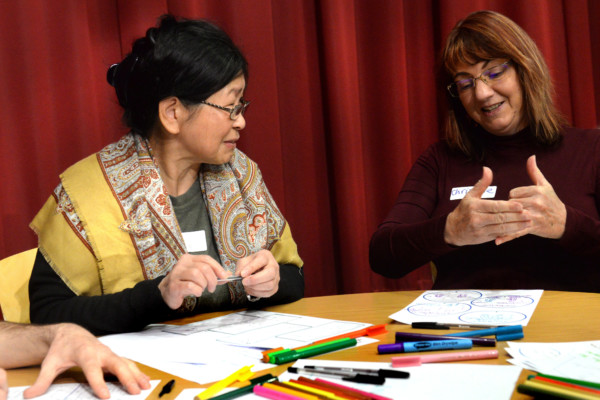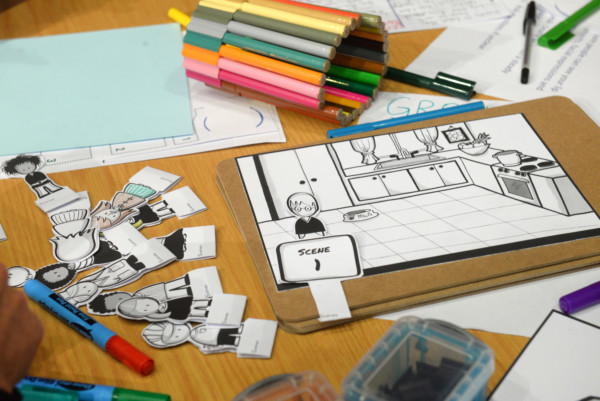Hearing Health Now – sparking important conversations
Vocal supports NIHR Manchester Biomedical Research Centre (BRC) researchers to involve and engage people in health research. Paolo Arru, Vocal Project Manager, tells us about Hearing Health Now – a unique and innovative project which aims to spark more conversations around hearing health. He reminds us through this project of the importance of creating opportunities for open conversations between researchers and the people they are aiming to reach and engage.

Between autumn 2019 and spring 2020 Vocal brought together people with an interest in the topic, including artists, researchers and service users to create “Hearing Health Now,” a public engagement project. The intention of the project was to provide opportunities for people to consider how they related to ‘hearing health’, what experiences they associated with it and then develop outputs that could be shared with wider audiences. Our starting point was to consider the intersections between the medical and social models of disability; this meant avoiding a focus on concepts of ‘good’ or ‘bad’ hearing.
We believe that Hearing Health Now is the first of its kind, bringing together people with different experiences to work together in this way. The project created unique opportunities for researchers, D/deaf BSL users, hearing aid users and people with mixed experiences of hearing to explore each other’s perspectives and to share what matters to them in relation to hearing health.
Project participants felt that creating striking visual content would best convey their experiences to wider audiences, so working with a designer was an integral part of the workshops. The different perspectives and discussions have now been condensed into a series of digital posters and an animation, which we plan to share around World Hearing Day on 3 March 2021 – in the hope of sparking new conversations about hearing health, bringing awareness of its broad impacts to more people and highlighting the value of getting involved in research.

What matters to people?
These are some of the key themes that arose about hearing during the workshops:
Hearing Health is tiring
Although experiences are different, many people in the group mentioned the constant mental effort required when communicating and interacting with others.
This is particularly true when the environment is out of people’s control (e.g. shopping or medical appointments) and where the priority is focused on verbal communication.
“My home is a Deaf friendly zone, outside is different!”
Hearing Health is social
Throughout the project, participants reflected on how their experience of social situations was integral to hearing health.
“It can be difficult to be part of social interactions and networks if your experience of sound is not similar to others.”
“When I pick up the kids from school, I can’t join the chats that other parents are having. It makes me feel anxious that I am missing social cues and that I can’t develop social networks. I feel outside of that network.”
It’s not something we talk about
“We don’t chat about hearing very much. I think if more people had conversations about their hearing, things would start to change for the better.”
Most of the participants mentioned that they don’t really speak about or think about hearing health, for different reasons but, stigma was a reason common to everyone.
The reason for stigma was varied but a frequent comment related to the idea that having a different experience of sound means ‘lacking something’.
Looking after our teeth or eyes is frequently referred to as dental health and vision health, respectively, but an important learning point was that many people weren’t familiar with the term hearing health. This might be a reflection of the medical model that emphasises hearing loss. This is a key consideration to make when we are trying to engage with people outside of the research community. How are we to meaningfully involve and engage people, if we use a term they don’t recognise themselves in?
What can researchers learn from this project?
This project highlights the value of creating opportunities for open conversations between researchers and people that they are aiming to reach and engage.
Through these workshop activities, it became clear that there is no ‘one size fits all’ approach to tackling hearing loss, and it's important that the outcomes of our research can be tailored to suit the needs of the individual. It was an exceptionally valuable experience to meet with members of the community with a range of hearing difficulties and to hear about how it affects their day-to-day lives. What really struck home was how unique each person’s experience was, and to discover what hearing means to each individual.
Dr Sam Couth, Manchester BRC Hearing Health Researcher
An inclusive approach to research ensures that people who have different experiences are supported to input into the design of the research. The project also reinforces the importance of accessibility at every stage of research. From the outset of the project we talked to people to understand how we could support them to contribute meaningfully and we organised activities on that basis.
Next steps:
Outputs from Hearing Health Now have been shared on Vocal’s social media @letsgetvocal on Facebook and Twitter. You can also find them here.
We’re also keen to work with partners who would like to collaborate with us for World Hearing Day. If you’re interested, please get in touch with me at: paolo.arru@mft.nhs.uk
Vocal creates opportunities for people to have a voice in research across the NIHR Manchester Biomedical Research Centre (BRC), NIHR Manchester Clinical Research Facility (CRF) and Research and Innovation at Manchester University NHS Foundation Trust (MFT). You can find out more here.
Note: All photos were taken before social distancing was introduced.
